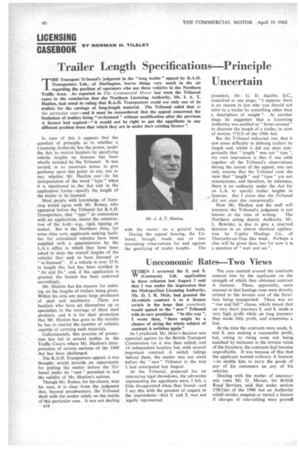CASEBOOK BY NORMAN H. TILSLEY
Page 42

If you've noticed an error in this article please click here to report it so we can fix it.
Trailer Length Specifications—Principle Uncertain
THE Transport Tr:bunal's judgment in the "long trailer" appeal by R.A.H. Transporters Ltd., of Darlington, leaves things very much in the air regarding the position of operators who use these vehicles in the Northern Traffic Area. As reported in The Commercial Motor last week the Tribunal came to the conclusion that the Northern Licensing Authority, Mr. J. A. T. Hanlon, had erred in ruling that R.A.H. Transporters could use only one of its trailers for the carriage of long-length material. The Tribunal ruled that in the particular case—and it must be remembered that the appeal concerned the limitation of trailers being " re-licensed " without modification after the previous A licence had expired—" it would not be right to put the appellants in any different position from that which they are in under their existing licence ".
In view of this it appears that the question of principle as to whether a Licensing Authority has the power, under the Act, to restrict hauliers by specifying vehicle lengths on licences has been wholly avoided by the Tribunal. It was invited, in no uncertain terms, to give guidance upon this point: to say, yea or nay, whether Mr. Hanlon can—by his interpretation of the word " type " when it is mentioned in the Act and in the application forms—specify the length of the trailer to be licensed.
Most people with knowledge of licensing would agree with Mr. Robey, who appeared before the Tribunal for R.A.H. Transporters, that " type " in connection with an application, meant the construction of the body—e.g., rigid, tipping or tanker. But in the Northern Area, for some time now, applicants seeking facilities for articulated vehicles have been supplied with a questionnaire by the L.A.'s office in which they have been asked to state the overall lengths of the vehicles they seek to have licensed or "re-licensed ". If a vehicle is over 35 ft. in length this fact has been notified in "As and Ds" and, if the application is granted, the licence has been endorsed accordingly.
Mr. Hanlon has his reasons for insisting on the lengths of trailers being given. Within his area are many large producers of steel and machinery. There are hauliers who have set themselves up as specialists in the carriage of these steel products, and it is for their protection that Mr. Hanlon has gone to the trouble he has to restrict the number of vehicles capable of carrying such materials.
Unfortunately, this practice of protection has led to several battles in the Traffic Courts where Mr. Hanlon's interpretation of certain sections of the 1960 Act has been challenged.
The R.A.H. Transporters appeal, it was thought, would provide an opportunity for putting the matter before the Tribunal under its " new " president to test the validity of Mr. Hanlon's actions.
Though Mr. Robey, for his clients, won his case, it is clear from the judgment that, beyond peradventure, the Tribunal dealt with the matter solely on the merits of this particular case. It was not dealing B16 with the matter on a general basis. During the appeal hearing, the Tribunal, though, made one or two interesting observations for and against the specifying of trailer lengths. The
president, Mr. G. D. Squibb, Q.C., remarked at one stage: "I. suppose there is no reason in law why you should not refer to a trailer by something other than a description of weight ". At another stage he suggested that a Licensing Authority was entitled to " ferret around" to discover the length of a trailer, in view of section 172(3) of the 1960 Act.
But the Tribunal indicated, too, that it saw some difficulty in defining trailers by length and, whilst it did not state categorically that " length " was not "type ", my own impression is that if one adds together all the Tribunal's observations during the course of the appeal, one can only assume that the Tribunal took the view that " length " and " type " are not synonymous, and therefore, by inference, there is no authority under the Act for an L.A. to specify trailer lengths in licences. But I stress that the Tribunal did not state this categorically.
• How Mr. Hanlon and his staff will interpret the Tribunal's judgment is not known at the time of writing. The Northern acting deputy Authority, Mr. L. Bewicke, is due to give a reserved decision in an almost identical application by Copley Haulage Co., of Thornaby-on-Tees this week. Perhaps a clue will be given then, but for now it is a question of "wait and see".




















































































































